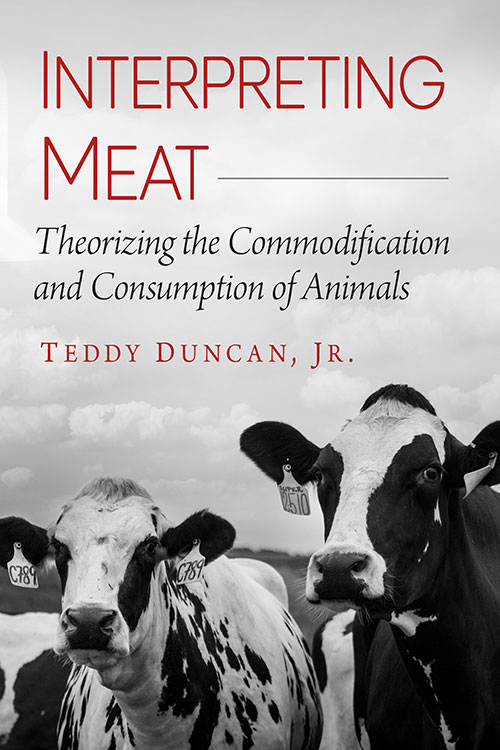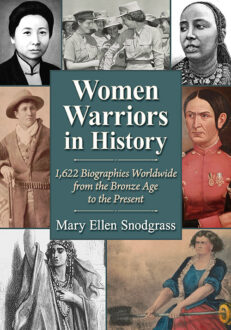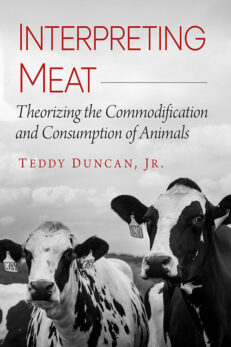Interpreting Meat
Theorizing the Commodification and Consumption of Animals
$55.00
In stock
About the Book
Meat is the essential object dislodged in human-animal relations: in its commonplace, everyday ubiquity and distanced violence, it defies the innocuous or protective-paternalistic stance that we ordinarily take towards animals. Through looking at meat’s status as a fundamental and visceral part of human-animal relations—particularly its commodification and consumption—this book exhibits how animals fit into human discursive practices and how this discursive position determines our perspective of animals and, subsequently, our treatment of them. Modernity is a distinct stage of meat production and accordingly, the meat-commodity must be examined in all its contemporary specificity as an economic, linguistic, philosophical, psychoanalytic, and material object. Using theoretical prisms that have been largely overlooked in animal studies, such as Marxian analysis and Lacanian-Žižekian psychoanalysis, and rejecting popular approaches, such as analogical thinking and effacement of human-animal difference, this book offers new insights into the meat-commodity—and new ways to orient ourselves towards animal life and death.
About the Author(s)
Bibliographic Details
Teddy Duncan, Jr.
Format: softcover (6 x 9)
Pages: 202
Bibliographic Info: notes, bibliography, index
Copyright Date: 2025
pISBN: 978-1-4766-9426-9
eISBN: 978-1-4766-5518-5
Imprint: McFarland
Table of Contents
Acknowledgments ix
Preface: The Obscenity of the (Animal) Text 1
Introduction: The Human “X” 5
1. The Meat-Commodity: Recognizing Exploitation and Rejecting Analogy 29
2. Life-as-Labor: Animals, Value, and Language 50
3. Animals as the “Symptom” of Capitalism and the Commodity-Form 72
4. “But Nevertheless…” 96
5. The Slaughter Always Returned To: The “Real” of Meat 119
6. Desire Beyond Enjoyment: A Praxis 145
Conclusion: Negation and Ethics 173
Chapter Notes 177
Bibliography 187
Index 191
Book Reviews & Awards
• “We are regularly bombarded by texts about the horrors we inflict on animals, texts which emphasize the need for some kind of basic solidarity with animals, since we are all living species on our earth. Teddy Duncan does something long awaited here: he shifts the focus on meat as a commodity, on how our mistreatment of animals is emblematic of today’s capitalism. In his approach which unites Marxism and psychoanalysis, all the fetishes and fantasies at work in our treatment of animals are clearly displayed. Nothing will remain the same after Duncan’s book – all those who deal with the relationship between humans and animals but ignore capitalist reality will appear as what they are: ignorants who pass in silence over the key dimension of the problem. If Duncan’s book will not become a classic, then we perhaps deserve to perish.”—Slavoj Žižek
• “Bringing Marxist and psychoanalytic insights to bear on the processes of meat production and consumption, Duncan’s fascinating analysis uncovers a novel way of thinking about resisting the meat-commodity: not through prohibitive ethical or legal injunctions, but through recognition and transformation of the social relations and desires that ultimately render animals as Others to be commodified and consumed. This work is both an essential contribution and fundamental challenge to existing discussions in animal studies.”—Matthew Calarco, professor of philosophy, California State University, Fullerton
• “Interpreting Meat offers new tools to make sense of the products from capitalist animal agriculture, the consumer desire for these products and the challenge of developing food futures without meat. By encouraging readers to examine meat not through analogy but instead as symptom, Teddy Duncan offers an original and engaging application of the Lacanian psychoanalytic frame.”—Dinesh Wadiwel, The University of Sydney
• Interpreting Meat allows fresh insights into one of the most urgently relevant topics of our time. How we treat animal bodies is part of a larger, and profoundly problematic, prioritization of human preferences over animal well-being. We are increasingly confronted with the unsustainability of contemporary modes of interaction with the more-than-human world. A book that facilitates new ways of thinking about meat can help us move beyond entrenched and naturalized understandings of animals. This is such a text, and readers, animals and the planet stand to benefit a great deal from the challenges, tools and questions Duncan offers us. By exposing and critiquing the dynamics at play in our treatment of animals, Interpreting Meat helps to ensure that we cannot say that we did not know what we are complicit in when we participate in the commodification and consumption of animals. Duncan’s theoretical interventions place the ball firmly in our court, and history will judge us harshly if we persist in our destructive, hyper-capitalist consumption patterns.”—Jessica Murray, professor, College of Graduate Studies—University of South Africa





